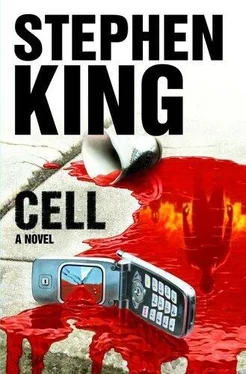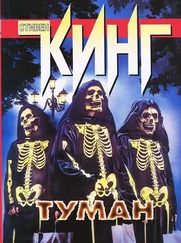"So to speak," Clay said.
"Ha-ha."
"Have you got flashlights?" Clay asked.
"Flashlights and a Coleman lantern that should be even better, but let's get in the kitchen first."
They followed him down the hallway, Alice walking between the two men. Clay could hear her breathing rapidly, trying not to let the unfamiliar surroundings freak her out, but of course it was hard. Hell, it was hard for him. Disorienting. It would have been better if there had been even a little light, but—
His knee bumped one of the tables Tom had mentioned, and something that sounded all too ready to break rattled like teeth. Clay steeled himself for the smash, and for Alice's scream. That she would scream was almost a given. Then whatever it was, a vase or some knickknack, decided to live a little longer and settled back into place. Still, it seemed like a very long walk before Tom said, "Here, okay? Hard right."
The kitchen was nearly as black as the hall, and Clay had just a moment to think of all the things he was missing and Tom must be missing more: a digital readout on the microwave oven, the hum of the fridge, maybe light from a neighboring house coming in through the window over the kitchen sink and making highlights on the faucet.
"Here's the table," Tom said. "Alice, I'm going to take your hand. Here's a chair, okay? I'm sorry if I sound like we're playing blindman's bluff."
"It's all r—," she began, then gave a little scream that made Clay jump. His hand was on the haft of his knife (now he thought of it as his) before he even realized he'd reached for it.
"What?" Tom asked sharply. "What?"
"Nothing," she said. "Just. . . nothing. The cat. His tail. . . on my leg."
"Oh. I'm sorry."
"It's all right. Stupid," she added with self-contempt that made Clay wince in the dark.
"No," he said. "Let up on yourself, Alice. It's been a tough day at the office."
"Tough day at the office!" Alice repeated, and laughed in a way Clay didn't care for. It reminded him of her voice when she'd called Tom's house beautiful. He thought, That's going to get away from her, and then what do I do? In the movies the hysterical girl gets a slap across the chops and it always brings her around, but in the movies you can see where she is.
He didn't have to slap her, shake her, or hold her, which was what he probably would have tried first. She heard what was in her own voice, maybe, got hold of it, and bulldogged it down: first to a choked gargle, then to a gasp, then to quiet.
"Sit," Tom said. "You have to be tired. You too, Clay. I'll get us some light."
Clay felt for a chair and sat down to a table he could hardly see, although his eyes had to be fully adjusted to the dark by now. There was a whisper of something against his pants leg, there and gone. A low miaow. Rafe.
"Hey, guess what?" he said to the dim shape of the girl as Tom's footsteps receded. "Ole Rafer just put a jump in me, too." Although he hadn't, not really.
"We have to forgive him," she said. "Without that cat, Tom would be just as crazy as the rest of them. And that would be a shame."
"It would."
"I'm so scared," she said. "Do you think it will get better tomorrow, in the daylight? The being scared part?"
"I don't know."
"You must be worried sick about your wife and little boy."
Clay sighed and rubbed his face. "The hard part is trying to come to grips with the helplessness. We're separated, you see, and—" He stopped and shook his head. He wouldn't have gone on if she hadn't reached out and taken his hand. Her fingers were firm and cool. "We separated in the spring. We still live in the same little town, what my own mother would have called a grass marriage. My wife teaches at the elementary school."
He leaned forward, trying to see her face in the dark.
"You want to know the hell of it? If this had happened a year ago, Johnny would have been with her. But this September he made the jump to middle school, which is almost five miles away. I keep trying to figure if he would have been home when things went nuts. He and his friends ride the bus. I think he would have been home. And I think he would have gone right to her."
Or pulled his cellphone out of his backpack and called her! the panic-rat suggested merrily . . . then bit. Clay felt himself tightening his fingers down on Alice's and made himself stop. But he couldn't stop the sweat from springing out on his face and arms.
"But you don't know," she said.
"No."
"My daddy runs a framing and print shop in Newton," she said. "I'm sure he's all right, he's very self-reliant, but he'll be worried about me. Me and my. My you-know."
Clay knew.
"I keep wondering what he did about supper," she said. "I know that's crazy, but he can't cook a lick."
Clay thought about asking if her father had a cell phone and something told him not to. Instead he asked, "Are you doing all right for now?"
"Yes," she said, and shrugged. "What's happened to him has happened. I can't change it."
He thought: I wish you hadn't said that.
"My kid has a cell phone, did I tell you that?" To his own ears, his voice sounded as harsh as a crow's caw.
"You did, actually. Before we crossed the bridge."
"Sure, that's right." He was gnawing at his lower lip and made himself stop. "But he didn't always keep it charged. Probably I told you that, too."
"Yes."
"I just have no way of knowing." The panic-rat was out of its cage, now. Running and biting.
Now both of her hands closed over both of his. He didn't want to give in to her comfort—it felt hard to let go of his grip on himself and give in to her comfort—but he did it, thinking she might need to give more than he needed to take. They were holding on that way, hands linked next to the pewter salt and pepper shakers on Tom McCourt's little kitchen table, when Tom came back from the cellar with four flashlights and a Coleman lantern that was still in its box.
8
The coleman gave off enough light to make the flashlights unnecessary. It was harsh and white, but Clay liked its brilliance, the way it drove away every single shadow save for their own and the cat's—which went leaping fantastically up the wall like a Halloween decoration cut from black crepe paper—into hiding.
"I think you should pull the curtains," Alice said.
Tom was opening one of the plastic sacks from the Metropolitan Cafe, the ones with DOGGY BAG on one side and PEOPLE BAG on the other. He stopped and looked at her curiously. "Why?"
She shrugged and smiled. Clay thought it the strangest smile he had ever seen on the face of a teenage girl. She'd cleaned the blood off her nose and chin, but there were dark weary-circles under her eyes, the Coleman lamp had bleached the rest of her face to a corpselike pallor, and the smile, showing the tiniest twinkle of teeth between trembling lips from which all the lipstick had now departed, was disorienting in its adult artificiality. He thought Alice looked like a movie actress from the late 1940s playing a socialite on the verge of a nervous breakdown. She had the tiny sneaker in front of her on the table. She was spinning it with one finger. Each time she spun it, the laces flipped and clicked. Clay began to hope she would break soon. The longer she held up, the worse it would be when she finally let go. She had let some out, but not nearly enough. So far he'd been the one to do most of the letting-out.
"I don't think people should see we're in here, that's all," she said. She flicked the sneaker. What she had called a Baby Nike. It spun. The laces flipped and clicked on Tom's highly polished table. "I think it might be . . .bad."
Tom looked at Clay.
"She could be right," Clay said. "I don't like us being the only lit-up house on the block, even if the light's at the back."
Читать дальше








